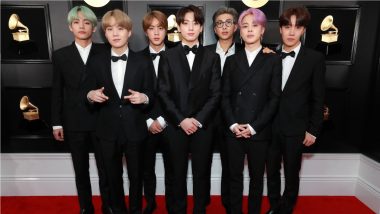Despite the impact of China's crackdown on K-pop fandom, the K-pop physical album market has continued to grow. According to the Gaon Chart on the 15th, cumulative sales of the top 400 albums reached 43 million copies from January to September this year. Even though sales in the fourth quarter have not yet been added up, it has already surpassed last year's sales, which surpassed exceeded 40 million copies for the first time in history. K-Pop Icons BTS All Set To Join the World Leaders at UN General Assembly on Monday.
If album sales in the fourth quarter are added up at the end of the year, annual sales are expected to surpass 50 million copies. Early last month, there were some negative predictions that China's crackdown on K-pop culture, including banning fan accounts of K-pop artists such as BTS, EXO, NCT, Girls Generation, and IU on Wiebo, will have an impact on album sales.
It is because the purchases of physical album depend on fandom activities, but fan clubs in China may have difficulties engaging in fandom activities due to the crackdown on K-pop. However, despite some concerns, there has been no adverse effect so far. If album sales in the fourth quarter are similar to last year's, total physical album sales could reach nearly 60 million this year.
A senior researcher of Gaon Chart Kim Jin-woo said, "The recent crackdown on K-pop fandom in China has not had much impact on the K-pop physical album market."
As major K-pop group SEVENTEEN will release the new album soon and BTS is also expected to release their new album as early as this year, it is a pretty reasonable prediction. China is definitely the biggest market for the next generation of Hallyu, But the dependence has decreased.
It is undeniable that the Chinese market, which has more than 1.44 billion people, about a fifth of the world's population, is definitely the biggest market for the 'next-generation of Hallyu' (Korean Wave).' Since it has not been fully opened to foreign cultures yet, the market benefits are expected to be countless when Chinese local authorities open the door to popular cultures widely.
However, Chinese authorities are still directly regulating the popular culture market, causing various side effects. Previously, there was quite a lot of controversy in Korea as K-pop artists who are from China mentioned Hong Kong's democracy movement and anti-Americanism. K-Pop Bands, Fandom Names and Their Meanings: From BTS’ ARMY to BLACKPINK’s BLINK, Here’s A Complete List of South Korean Music Groups’ Fan Club Names.
China's crackdown on K-pop culture have also been greatly affected by political issues, with China taking full bans on Hallyu cultures due to the Korean government's decision to introduce the Terminal High Altitude Area Defense (THAAD) in 2016. This is why some say that the channels for Hallyu expansion should be diversified after THAAD.
In fact, China's importance for physical album exports is also decreasing.
According to the report released by the Korea Customs Service late last year, Japan is the largest importer of the K-pop album in 2020. It has been steadily maintaining the No.1 position since 2017.
However, the second place has changed. Since 2017, the U.S. has pushed China, which ranked second, down one notch. Korea recorded $17 million (about 201 billion won) exports in the U.S. last year, showing the largest export growth rate over the past three years. China, which fell to third place, also recorded $16 million (18.9 billion won) last year, up 26.9% year-on-year.
However, K-pop exports' dependence on Asia, including China, is gradually decreasing.
In 2017, 92.6% of K-pop exports were made in Asia and 7.4 percent in non-Asia countries. Most of them were concentrated in Asia. However, the proportion of non-Asia regions expanded to 24.2% last year. K-pop album importing countries also increased from 78 in 2017 to 114 last year.
In particular, the growth of K-pop in the North American market, which is known as the home ground of pop music, is notable. Recently, BTS, BLACKPINK Lisa, and TWICE entered the Billboard's main single chart 'Hot 100.'
In addition, major K-pop groups such as NCT127 and TOMORROW X TOGETHER as well as BTS are frequently entering the Billboard's main album chart 'Billboard 200' with their powerful fandom.
According to the '2020 Global Hallyu Trend' by the Korea Foundation for International Culture Exchange, the number of Hallyu fans in the world exceeded 100 million for the first time since the 2012 survey, mainly increasing significantly in the U.S. While the number of K-pop fans in Asia, which was the most important market of K-pop, decreased, the number of fans in the Americas increased by about 30% year-on-year to 15.8 million.
"Not too long ago, North American market was a dream stage for K-pop, so many companies hesitated to actively enter," said an official from the agency which has idol group who entered the Billboard chart. "However, starting with BTS, North American markets have been pioneered and possibilities have emerged. In these days, the North American market is considered more stable and easier than the high-risk Chinese market."
(The above story is verified and authored by ANI staff, ANI is South Asia's leading multimedia news agency with over 100 bureaus in India, South Asia and across the globe. ANI brings the latest news on Politics and Current Affairs in India & around the World, Sports, Health, Fitness, Entertainment, & News. The views appearing in the above post do not reflect the opinions of LatestLY)













 Quickly
Quickly


